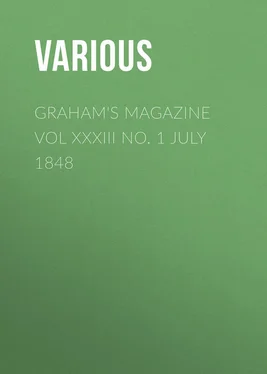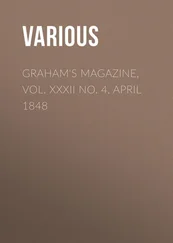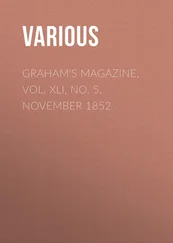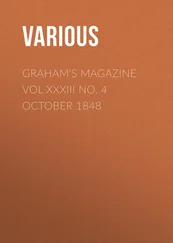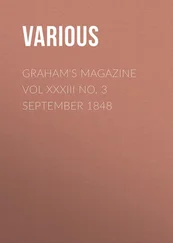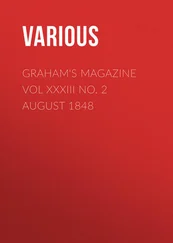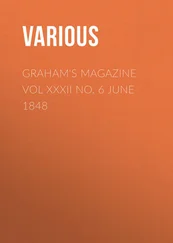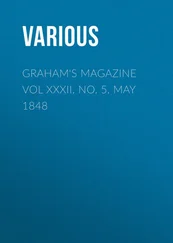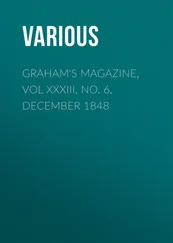Various - Graham's Magazine Vol XXXIII No. 1 July 1848
Здесь есть возможность читать онлайн «Various - Graham's Magazine Vol XXXIII No. 1 July 1848» — ознакомительный отрывок электронной книги совершенно бесплатно, а после прочтения отрывка купить полную версию. В некоторых случаях можно слушать аудио, скачать через торрент в формате fb2 и присутствует краткое содержание. Издательство: Иностранный паблик, Жанр: periodic, literature_19, foreign_edu, на английском языке. Описание произведения, (предисловие) а так же отзывы посетителей доступны на портале библиотеки ЛибКат.
- Название:Graham's Magazine Vol XXXIII No. 1 July 1848
- Автор:
- Издательство:Иностранный паблик
- Жанр:
- Год:неизвестен
- ISBN:нет данных
- Рейтинг книги:4 / 5. Голосов: 1
-
Избранное:Добавить в избранное
- Отзывы:
-
Ваша оценка:
- 80
- 1
- 2
- 3
- 4
- 5
Graham's Magazine Vol XXXIII No. 1 July 1848: краткое содержание, описание и аннотация
Предлагаем к чтению аннотацию, описание, краткое содержание или предисловие (зависит от того, что написал сам автор книги «Graham's Magazine Vol XXXIII No. 1 July 1848»). Если вы не нашли необходимую информацию о книге — напишите в комментариях, мы постараемся отыскать её.
Graham's Magazine Vol XXXIII No. 1 July 1848 — читать онлайн ознакомительный отрывок
Ниже представлен текст книги, разбитый по страницам. Система сохранения места последней прочитанной страницы, позволяет с удобством читать онлайн бесплатно книгу «Graham's Magazine Vol XXXIII No. 1 July 1848», без необходимости каждый раз заново искать на чём Вы остановились. Поставьте закладку, и сможете в любой момент перейти на страницу, на которой закончили чтение.
Интервал:
Закладка:
"And then, my father?"
"Oh, then, Raoul, you are at liberty to let your good sword feel the fresh air, and to give your horse a taste of those fine spurs you wear. But even in that case, I should advise you to use your edge rather than your point. There is not much harm done in wiping a saucy burgher across the face to mend his manners, but to pink him through the body makes it an awkward matter. And I need not tell you by no means to fire, unless you should be so beset and maltreated that you cannot otherwise extricate yourself – yet you must have your pistols loaded. In these times it is necessary always to be provided against all things. I do not, however, tell you these things now because you are likely to be attacked but such events are always possible, and one cannot provide against such too early."
"I will observe what you say, my father. Have I your permission now to depart?"
"Not yet, Raoul, I would speak with you first a few words. This Mademoiselle Melanie is very pretty, is she not?"
"She is the most beautiful lady I have ever seen," replied the youth, not without some embarrassment.
"And as amiable and gentle as she is beautiful?"
"Oh, yes, indeed, sir. She is all gentleness and sweetness, yet is full of mirth, too, and graceful merriment."
"In one word, then, she seems to you a very sweet and lovely creature."
"Doubtless she does, my father."
"And I beseech you tell me, viscount, in what light do you appear in the eyes of this very admirable young lady?"
"Oh, sir!" replied the youth, now very much embarrassed, and blushing actually from shame.
"Nay, Raoul, I did not ask the question lightly, I assure you, or in the least degree as a jest. It becomes very important that I should know on what terms you and this fair lady stand together. You have been visiting her now almost daily, I think, during these three months last past. Do you conceive that you are very disagreeable to her?"
"Oh! I hope not, sir. It would grieve me much if I thought so."
"Well, I am to understand, then, that you think she is not blind to your merits, sir."
"I am not aware, my dear father, that I have any merits which she should be called to observe."
"Oh, yes, viscount! That is an excess of modesty which touches a little, I am afraid, on hypocrisy. You are not altogether without merits. You are young, not ill-looking, nobly born, and will, in God's good time, be rich. Then you can ride well, and dance gracefully, and are not generally ill-educated or unpolished. It is quite as necessary, my dear son, that a young man should not undervalue himself, as that he should not think of his deserts too highly. Now that you have some merits is certain – for the rest I desire frankness of you just now, and beg that you will speak out plainly. I think you love this young girl. Is it not so, Raoul?"
"I do love, sir, very dearly; with my whole heart and spirit."
"And do you feel sure that this is not a mere transient liking – that it will last, Raoul?"
"So long as life lasts in my heart, so long will my love for her last, my father."
"And you would wish to marry her?"
"Beyond all things in this world, my dear father."
"And do you think that, were her tastes and views on the subject consulted, she would say likewise?"
"I hope she would, sir. But I have never asked her."
"And her father, is he gracious when you meet him?"
"Most gracious, sir, and most kind. Indeed, he distinguishes me above all the other young gentlemen who visit there."
"You would not then despair of obtaining his consent?"
"By no means, my father, if you would be so kind as to ask it."
"And you desire that I should do so?"
"You will make me the happiest man in all France, if you will."
"Then go your way, sir, and make the best you can of it with the young lady. I will speak myself with the Sieur d'Argenson to-night; and I do not despair any more than you do, Raoul. But look you, boy, you do not fancy, I hope, that you are going to church with your lady-love to-morrow or the next day. Two or three years hence, at the earliest, will be all in very good time. You must serve a campaign or two first, in order to show that you know how to use your sword."
"In all things, my dear father, I shall endeavor to fulfill your wishes, knowing them to be as kindly as they are wise and prudent. I owe you gratitude for every hour since I was born, but for none so much as for this, for indeed you are going to make me the happiest of men."
"Away with you, then, Sir Happiness! Betake yourself on the wings of love to your bright lady, and mind the advice of your favorite Horace, to pluck the pleasures of the passing hour, mindful how short is the sum of mortal life."
The young man embraced his father gayly, and left the room with a quick step and a joyous heart; and the jingling of his spurs, and the quick, merry clash of his scabbard on the marble staircase, told how joyously he descended its steps.
A moment afterward his father heard the clear, sonorous tones of his fine voice calling to his attendants, and yet a few seconds later the lively clatter of his horse's hoofs on the resounding pavement.
"Alas! for the happy days of youth, which are so quickly flown," exclaimed the father, as he participated the hopeful and exulting mood of his noble boy. "And, alas! for the promise of mortal happiness, which is so oft deceitful and a traitress." He paused for a few moments, and seemed to ponder, and then added with a confident and proud expression, "But I see not why one should forebode aught but success and happiness to this noble boy of mine. Thus far, every thing has worked toward the end as I would wish it. They have fallen in love naturally and of their own accord, and d'Argenson, whether he like it or no, cannot help himself. He must needs accede, proudly and joyfully, to my proposal. He knows his estates to be in my power far too deeply to resist. Nay, more, though he be somewhat selfish, and ambitious, and avaricious, I know nothing of him that should justify me in believing that he would sell his daughter's honor, even to a king, for wealth or title! My good wife is all too doubtful and suspicious. But, hark! here comes the mob, returning from that unfortunate man's execution. I wonder how he bore it."
And with the words he moved toward the window, and throwing it open, stepped out upon the spacious balcony. Here he learned speedily from the conversation of the passing crowd, that, although dreadfully shocked and startled by the first intimation of the death he was to undergo, which he received from the sight of the fatal wheel, the Lord of Kerguelen had died as becomes a proud, brave man, reconciled to the church, forgiving his enemies, without a groan or a murmur, under the protracted agonies of that most horrible of deaths, the breaking on the wheel.
Meanwhile the day passed onward, and when evening came, and the last and most social meal of the day was laid on the domestic board, young Raoul had returned from his visit to the lady of his love, full of high hopes and happy anticipations. Afterward, according to his promise, the Count de St. Renan went forth and held debate until a late hour of the night with the Sieur d'Argenson. Raoul had not retired when he came home, too restless in his youthful ardor even to think of sleep. His father brought good tidings, the father of the lady had consented, and on their arrival in Britanny the marriage contract was to be signed in form.
That was to Raoul an eventful day; and never did he forget it, or the teachings he drew from it. That day was his fate.
[To be continued.THE LAND OF THE WEST
Thou land whose deep forest was wide as the sea,
And heaved its broad ocean of green to the day,
Or, waked by the tempest, in terrible glee
Flung up from its billows the leaves like a spray;
The swift birds of passage still spread their fleets there,
Where sails the wild vulture, the pirate of air.
Интервал:
Закладка:
Похожие книги на «Graham's Magazine Vol XXXIII No. 1 July 1848»
Представляем Вашему вниманию похожие книги на «Graham's Magazine Vol XXXIII No. 1 July 1848» списком для выбора. Мы отобрали схожую по названию и смыслу литературу в надежде предоставить читателям больше вариантов отыскать новые, интересные, ещё непрочитанные произведения.
Обсуждение, отзывы о книге «Graham's Magazine Vol XXXIII No. 1 July 1848» и просто собственные мнения читателей. Оставьте ваши комментарии, напишите, что Вы думаете о произведении, его смысле или главных героях. Укажите что конкретно понравилось, а что нет, и почему Вы так считаете.
